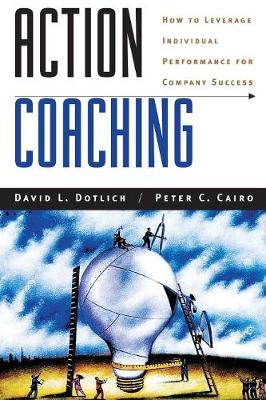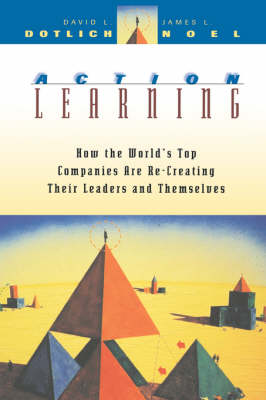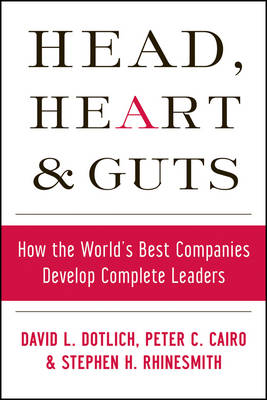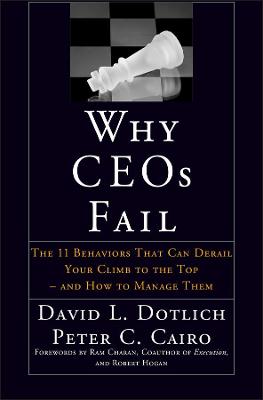J-B US non-Franchise Leadership
6 primary works
Book 275
Chances are, if you're a manager in most any organization today, coaching has become an integral part of your responsibilities. And there's no more effective approach to coaching than Action Coaching. Developed by the authors through their work with Levi Strauss, Colgate, Bank of America, Arthur Andersen and other leading companies, Action Coaching is the only coaching process that dramatically increases an individual's personal performance in direct correlation with established organizational goals. Here, Dotlich and Cairo share the same advice, techniques, and tools they've used to transform hundreds of managers and executives into first-rate coaches. Moreover, they clearly demonstrate how Action Coaching can be used as a strategy for achieving organizational goals by aligning personal improvement with a company's vision for the future.
Book 276
A Strategic Boot Camp for Leadership Development "David Dotlich has worked with top management of the best companies to deliver Action Learning programs for over fifteen years. His insights into how leaders develop and his experience as a coach and executive are captured in this excellent book." --Arnold Kanarick, executive president and chief human resources officer, The Limited Plug into a dynamic leadership development process custom made for today?s rapidly changing, technology-driven business environment. Unlike traditional classroom-style programs, Action Learning engages managers in emotionally intense, team-oriented experiences that directly address the immediate strategic needs of the organization. Here, authors Dotlich and Noel detail the many Action Learning sessions they?ve conducted at Shell, Ameritech, Citibank, and other leading corporations that have used Action Learning to quickly and successfully implement a variety of tactical and quantum change initiatives. Readers benefit from a clearly defined framework they can use to construct an Action Learning program of their own--a program that gives companies the power to re-create themselves by first re-creating their leaders.
Book 277
Head, Heart and Guts
by David L Dotlich, Peter C Cairo, and Stephen H Rhinesmith
Published 1 January 2006
This book reveals the three most important capabilities leaders must demonstrate today: the ability to set strategy, empathize with others, and take risks—all at the same time. In Head, Heart, and Guts, leadership experts David Dotlich, Peter Cairo, and Stephen Rhinesmith—who teach and coach CEOs and executive teams throughout the world—argue that to be successful in a complex, matrixed, fast-moving world, “whole” leaders must set strategy, develop trusting relationships with others, and consistently do the right thing based on personal values. “Partial” leaders, often the product of traditional executive programs, may be successful in the shortrun, but their companies lose over time. Filled with case studies of companies such as Bank of America, Johnson & Johnson, Novartis, and UBS, Head, Heart, and Guts, lays out specific steps and actions for leaders who want to grow beyond their “leadership comfort zone” and an action plan for companies that want to move beyond tried-and-true leadership development in order to develop “whole” leaders throughout their leadership pipeline.
Book 279
Leaders face numerous critical crossroads in their careers, moments that can provide extraordinary learning and growth opportunities or ensnare them and prevent further development. The good thing about these passages is that they’re predictable, and with proper preparation, leaders not only can survive them to become stronger but can use these experiences to enhance their leadership, compassion, and effectiveness. This book lays out thirteen specific “leadership passages” based on research, interviews, and coaching of senior executives in such well-known companies as Johnson & Johnson, Novarits, Intel, GE, and Bank of America. For each passage, the authors describe what to expect, how the passage constitutes a choice point, and what effective leaders do to navigate and grow from the challenge. Some of the passages include: moving into a leadership role for the first time, dealing with significant failure for which you are responsible, derailing/losing your job, being acquired/merging, losing faith in the system, understanding the importance of children, family and friends, and personal upheavals such as divorce, illness, and death. The authors provide a wealth of practical tools and techniques to improve your leadership, along with real-life examples from recognizable leaders and breakthrough ways in which companies can use the concept of leadership passages to grow talent.
Book 284
Leading in Times of Crisis
by David L Dotlich, Peter C Cairo, and Stephen H Rhinesmith
Published 1 January 2009
This book is designed to help leaders apply whole leadership lessons to the fundamental leadership dilemmas that keep leaders awake at night. The book explores how leaders developed their capacities for leadership and what they believe will be the key ways to prepare other leaders to meet these challenges in the future. Each section describes the challenges and includes specific tips for managing the challenges based on the interviews and research. The models are based on the authors' personal observations of the executives they have taught and coached over the last three years through Oliver Wyman's Delta Executive Learning Center, in addition to interviews with 20 current CEOs including William Weldon, CEO of Johnson & Johnson; Gregg Steinhoffe, CEO of Target; Mark Parker, CEO of Nike, and many others. David L. Dotlich (Eastsound, WA) is President of the Oliver Wyman Delta Executive Learning Center and a partner at Oliver Wyman Consulting, the world's leading executive development firm. Peter C. Cairo (New York, NY) is a partner at Oliver Wyman Consulting and is former chairman of the Department of Counseling and Organizational Psychology at Columbia University. Stephen H.
Rhinesmith (Chatham, MA) is a partner at Oliver Wyman Consulting and former president of Holland America Line.
Rhinesmith (Chatham, MA) is a partner at Oliver Wyman Consulting and former president of Holland America Line.
Book 286
If any of the following behaviors sound like you or someone you work with, beware! In Why CEOs Fail, David L. Dotlich and Peter C. Cairo describe the most common characteristics of derailed top executives and how you can avoid them:
- Arrogance—you think that you're right, and everyone else is wrong.
- Melodrama—you need to be the center of attention.
- Volatility—you're subject to mood swings.
- Excessive Caution—you're afraid to make decisions.
- Habitual Distrust—you focus on the negatives.
- Aloofness —you're disengaged and disconnected.
- Mischievousness—you believe that rules are made to be broken.
- Eccentricity—you try to be different just for the sake of it.
- Passive Resistance—what you say is not what you really believe.
- Perfectionism—you get the little things right and the big things wrong.
- Eagerness to Please—you try to win the popularity contest.




